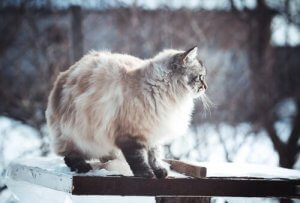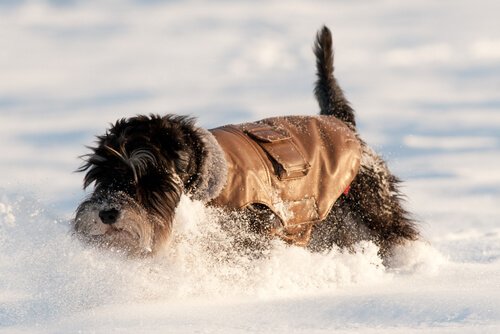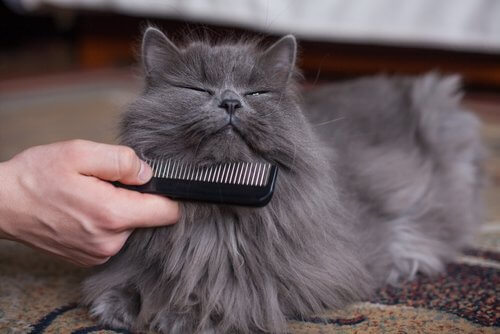Having Fun with Winter-Loving Dogs and Cats


Written and verified by the lawyer Francisco María García
There are many kinds of dogs and cats in the world, each with different characteristics. One of them is that some of these are winter-loving dogs and cats.
We know how fond cats are of seeking heat and laying down by chimneys and stoves. However, there are also some felines who love to be out in the snow. There are those who will even go skiing with their owners.
Do you have winter-loving dogs or cats?

In general, we should keep our pets’ hair longer in winter and shorter in summer. As a result, our dogs and cats will obtain a natural protective barrier against the cold weather and will be cooler in summer.
There are many clothing accessories for dogs and cats on the market. With them, we’ll help them keep their body temperature at a comfortable level. We should be very careful to remember this, especially if we’re going out with them in the snow.
In a similar way to what happens with people, providing our dogs and cats with adequate protection against the cold will avoid typical winter health problems, such as colds. We’ll also soften joint problems, such as osteoarthritis and other bone diseases.
Tips for taking your winter-loving dogs or cats out in the snow
- You must be careful not to lose sight of your pets. Although dogs have a good sense of smell, it won’t be easy for them to use it in the snow. As a result, they won’t be able to follow any traces. Therefore, it’s very important to have them well-controlled and not to lose sight of them.
- In order to prepare for the possibility that your pets may get lost, it’s advisable for them to wear the owner’s telephone number on their collar tag. This way they can be located quickly.
- Dog and cat paw pads can be very sensitive to snow. For this purpose, you can find paraffin or non-slip wax protectors on the market. There are also some creams that moisturize and add a layer to their paw pads.
- You mustn’t let your dogs and cats eat snow. To avoid this, you should always carry enough water with you.
Getting home after a day out in the snow
Even if your dogs or cats are well-protected, it’s possible that their skin or hair will still get wet. It’s important to dry their body very well with a towel or a warm air dryer. Especially if you see that they normally shiver in the winter season.
If your dog or cat’s paw pads look cracked, you can also apply products or creams that contain aloe vera to treat them.
The walkout in the cold or snow surely will have exhausted your pet’s energy. Therefore, you should help them recharge their batteries with an extra food ration and fresh water when you get home.
Remember, if you’re out in the snow you must prevent your dogs and cats from entering the sled or ski zones, in order to avoid causing any accidents.
Your pet’s skin in winter
Skin is a dog’s natural protector against cold and other external agents. Therefore, it’s very important to take care of your pet’s health so that their fur or hair protects them from the cold wind, rain, or snow.
Great care for your pet is based on a good diet, hygiene and daily brushing. With all the damp, their hair can easily get tangled and knots may also appear.
When bath time is here, use a specific shampoo for your pet’s hair type and a nourishing mask to moisturize specific areas such as hair tips, paws and beards. These areas are usually where their hair suffers the most damage.
During winter time, we recommend baths once a month, either at home or going to specialized pet hairdressers. These places will have better facilities to treat your winter-loving dogs or cat’s skin and hair.
Brushing

To make it easier, you can apply a nourishing conditioner on the pet’s hair before brushing. There are hair sprays with essential oils that make combing easier and help maintain good hair health in the market. Apart from providing shiny hair, they help create a protective layer on the fur, preventing water and dirt from adhering.
Drying after a bath
After a bath, or if your dog or cat is wet after a rainy day, it’s very important to dry it well. As a result, you’ll eliminate the excess of water and avoid skin problems such as dermatitis. Firstly, use a towel and then the hairdryer at medium temperature and at a distance making constant movements to avoid burning the hair or the skin.
There are many kinds of dogs and cats in the world, each with different characteristics. One of them is that some of these are winter-loving dogs and cats.
We know how fond cats are of seeking heat and laying down by chimneys and stoves. However, there are also some felines who love to be out in the snow. There are those who will even go skiing with their owners.
Do you have winter-loving dogs or cats?

In general, we should keep our pets’ hair longer in winter and shorter in summer. As a result, our dogs and cats will obtain a natural protective barrier against the cold weather and will be cooler in summer.
There are many clothing accessories for dogs and cats on the market. With them, we’ll help them keep their body temperature at a comfortable level. We should be very careful to remember this, especially if we’re going out with them in the snow.
In a similar way to what happens with people, providing our dogs and cats with adequate protection against the cold will avoid typical winter health problems, such as colds. We’ll also soften joint problems, such as osteoarthritis and other bone diseases.
Tips for taking your winter-loving dogs or cats out in the snow
- You must be careful not to lose sight of your pets. Although dogs have a good sense of smell, it won’t be easy for them to use it in the snow. As a result, they won’t be able to follow any traces. Therefore, it’s very important to have them well-controlled and not to lose sight of them.
- In order to prepare for the possibility that your pets may get lost, it’s advisable for them to wear the owner’s telephone number on their collar tag. This way they can be located quickly.
- Dog and cat paw pads can be very sensitive to snow. For this purpose, you can find paraffin or non-slip wax protectors on the market. There are also some creams that moisturize and add a layer to their paw pads.
- You mustn’t let your dogs and cats eat snow. To avoid this, you should always carry enough water with you.
Getting home after a day out in the snow
Even if your dogs or cats are well-protected, it’s possible that their skin or hair will still get wet. It’s important to dry their body very well with a towel or a warm air dryer. Especially if you see that they normally shiver in the winter season.
If your dog or cat’s paw pads look cracked, you can also apply products or creams that contain aloe vera to treat them.
The walkout in the cold or snow surely will have exhausted your pet’s energy. Therefore, you should help them recharge their batteries with an extra food ration and fresh water when you get home.
Remember, if you’re out in the snow you must prevent your dogs and cats from entering the sled or ski zones, in order to avoid causing any accidents.
Your pet’s skin in winter
Skin is a dog’s natural protector against cold and other external agents. Therefore, it’s very important to take care of your pet’s health so that their fur or hair protects them from the cold wind, rain, or snow.
Great care for your pet is based on a good diet, hygiene and daily brushing. With all the damp, their hair can easily get tangled and knots may also appear.
When bath time is here, use a specific shampoo for your pet’s hair type and a nourishing mask to moisturize specific areas such as hair tips, paws and beards. These areas are usually where their hair suffers the most damage.
During winter time, we recommend baths once a month, either at home or going to specialized pet hairdressers. These places will have better facilities to treat your winter-loving dogs or cat’s skin and hair.
Brushing

To make it easier, you can apply a nourishing conditioner on the pet’s hair before brushing. There are hair sprays with essential oils that make combing easier and help maintain good hair health in the market. Apart from providing shiny hair, they help create a protective layer on the fur, preventing water and dirt from adhering.
Drying after a bath
After a bath, or if your dog or cat is wet after a rainy day, it’s very important to dry it well. As a result, you’ll eliminate the excess of water and avoid skin problems such as dermatitis. Firstly, use a towel and then the hairdryer at medium temperature and at a distance making constant movements to avoid burning the hair or the skin.
This text is provided for informational purposes only and does not replace consultation with a professional. If in doubt, consult your specialist.








